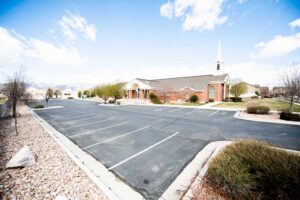Church parking lots are often thought of as public property, but this is not always the case. In fact, many churches maintain strict rules regulating who can park in their lot and what kind of vehicles are allowed. If you are not familiar with these rules, you may be subject to a fine if you violate them.
This article will explore the legalities of church parking lots and help you understand why they are such important properties. From there, you can learn how to stay on the right side of the law when using a church’s parking lot.
What Is The Definition Of Church Property?
Church property typically refers to any land or structure used by a church for religious purposes, such as a building or lot. The property may be owned by the church, leased from an unrelated party, or held in trust by the government. In some cases, the property may also include assets such as money or securities.
The law governing church property is complex and varies from country to country. Generally, church property is protected from seizure and can only be used for religious purposes. However, there are exceptions to this rule and sometimes restrictions on how the property can be used can be placed.
Generally, any person who trespasses on church property without authorization is subject to criminal penalties. Church officials may also sue individuals who trespass on their property for damages.
Are Church Parking Lots Private Property?
Generally speaking, churches are considered to be private property. This means that the church is able to regulate who can access its property and what they can do on the property. Generally, this includes banning people from parking on church grounds or interfering with church activities.
There are a few exceptions to this rule, however. For example, if the church is open to the public and charges for parking, then visitors are generally allowed to park on the property. Another exception is if there is a sign posted indicating that certain areas of the lot are for members only or for specific events. In these cases, visitors should respect these signs and not park in these areas.
Church Parking Lots Are Private Property
Church parking lots are private property, meaning that the church owns the land and can legally restrict who can use the lot. This includes preventing members of the public from parking in the lot. If you have a problem with this, you may need to take your dispute up with the church.
The Law Applies To All Churches
All churches, regardless of their denomination, must follow the same laws when it comes to parking lots. In most cases, church parking lots are considered private property and therefore can only be used by church members with permission from the church leadership. This permission usually requires a permit from the local government. If there is no permit available, then parking in a church lot generally requires a permit from the owner of the lot.
There are some exceptions to this rule. For example, if a church owns land that surrounds its parking lot, then general public parking is allowed on that land without a permit. Additionally, some religious exemptions to the law allow churches to disregard certain portions of it, such as allowing overnight parking in a church lot during events like Comic-Con or Music Festival Season.
Church leaders should make sure they are familiar with all local regulations regarding church parking before permitting members to park in their lot. It is also important to make sure members understand any restrictions placed on parking in order to ensure everyone has an enjoyable experience while visiting their localchurch!
The Church Can Charge For Parking
The church can charge for parking because the lot may be considered private property. This means that the church can set its own rules and regulations for how people can park in the lot, including charging for parking.
As a churchgoer, you may be wondering whether parking in the church lot is private property or not. The answer to this question is definitely ambiguous, as there is no specific legal definition of private property that applies specifically to churches. However, generally speaking, any area owned and used exclusively by a particular organization or group is considered private. This includes churches and their parking lots.

